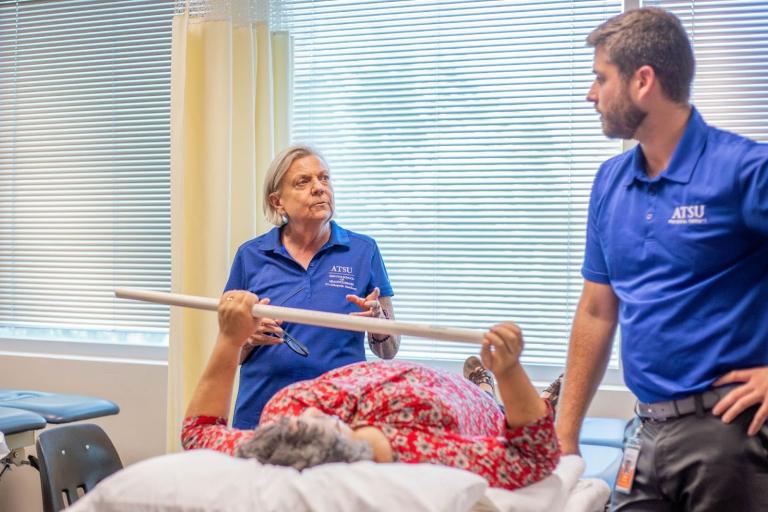Two decades of growth in ATSU-ASHS’ DPT program
Posted: December 11, 2023
Over the last 20 years, Cheri Hodges, PT, DPT, associate professor in A.T. Still University-Arizona School of Health Sciences’ (ATSU-ASHS) residential Doctor of Physical Therapy (DPT) program, has seen the PT profession grow and evolve in countless ways.
As one of the original ATSU-ASHS’ DPT program faculty members, not only has she seen the profession change, but she has seen the program blossom into what it is today, while remaining steadfast in its mission.
“A lot has happened in the profession, as well as the University, as well as our program. I think the more important thing to say is we still have the same attitude and goals of being centered around our students, and that hasn’t changed in over 20 years. That’s the reason I’m still here,” Dr. Hodges said.
Dr. Hodges joined ATSU in 2002 as an assistant professor, and she would later serve as the inaugural orthopedic residency program director. In addition to her roles at ATSU, she has over 30 years of clinical experience in orthopedic physical therapy.
“We’re an established program,” Dr. Hodges said. “Quite a few of our faculty have been like me and have been here for over 20 years, so we have a lot of experience to draw from.”
“We have a nice balance between people like myself that have been here a while and have some experience to share, but then also the newer faculty that come in and bring in excitement and new expertise and take our programs in different directions,” she added.
ATSU-ASHS’ DPT program is unique in many ways, one being the program’s fully residential aspect.
“There’s a change in PT education for new opportunities to do hybrid programs, more online education, and I’m glad that that’s an opportunity for our profession and for the students that want that type of learning experience,” Dr. Hodges explained.
She added, “We’re face-to-face and all of our faculty have an open door policy. We have labs that are every week as opposed to some of the programs that are doing lab intensives, and again, there’s positives and negatives to all of those, but I think those that have the opportunity to do residential education, there’s lots of opportunities that aren’t available online. That’s something that somebody should consider when they’re thinking about developing their skill set for the rest of their career.”
The residential aspect of the program emphasizes a hands-on approach to patient management, and labs are an essential part of the curriculum. Through labs, students develop their psychomotor skills, which prepares them to participate in supervised clinical internships during their third year of schooling, where they will apply these principles learned in the first two years of didactic work in a real patient environment.
“You have to develop skill sets and that takes repetition, it takes feedback,” Dr. Hodges said. “We’re a hands-on profession and it’s really important to develop your hands-on skills, and there’s no other way through that than to develop the skills, practice, get feedback, and continue to foster your development.”
Because Dr. Hodges has been with the DPT program since its inception, she has also seen countless alumni grow into professionals who are making a difference in their patients’ lives and changing the face of the PT profession.
“I get to work with some of our alumni in different aspects of their career,” Dr. Hodges said. “A lot of our alumni have gone on to leadership roles in both the state and national level, and in our professional association as well as clinically, have excelled in leadership roles, in professional sports, in industry, as well as in private practice. I’m really proud of our alumni. They’ve done some really neat things in the profession.”
One of the most recent graduates of the DPT program was accepted into a prestigious women’s health physical therapy residency at Saint Louis University, where she will train to become a highly skilled women’s health clinician.
“There’s just numerous stories, but we do stay well connected with our alumni that want to stay connected with us and I really, really enjoy that,” Dr. Hodges added.

